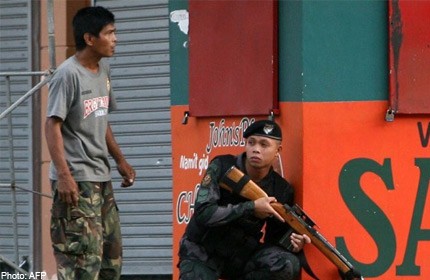Muslim rebel attack shuts down Philippine city

ZAMBOANGA, Philippines - A group of 100 heavily-armed Muslim rebels opposed to peace talks launched a major attack that shut down a bustling southern Philippine city Monday, authorities said.
Followers of Moro National Liberation Front (MNLF) leader Nur Misuari entered the coastal area of Zamboanga city by boat at dawn, triggering clashes that left at least one soldier dead and six wounded, the military said.
Fighting later spread to the city itself, with the rebels taking 20 civilian hostages to thwart government forces.
"The main target by the MNLF in encroaching Zamboanga City is to raise their banner of independence at city hall," city mayor Isabelle Climaco-Salazar said.
"As of now there are an estimated 20 people that have been held hostage," she said.
The long-running Muslim insurgency in the Philippines has left more than 150,000 dead, and led to a proliferation of armed groups that have left parts of Mindanao in a constant state of lawlessness.
Misuari's faction of the fractured MNLF, which he founded in the early 1970s, has made a renewed call for an independent Islamic state in the mainly-Catholic Philippines.
The government has been mired in troubled peace negotiations with rebel groups -- last month Misuari again declared he was breaking away from the government because he believed they were sidelining his group.
While some within the divided MNLF respect the peace process, others, including Misuari's wing, are opposed to it.
Loud shots could be heard on Monday around Zamboanga, a former colonial Spanish port with a population of nearly a million and one of the busiest commercial hubs on southern Mindanao island.
The military said that the hostages in the city were being used as human shields to prevent an army attack.
Streets were deserted and shops were shuttered. Heavily armed private security personnel as well as troops were guarding the airport, hotels, banks and other institutions, according to an AFP reporter on the ground.
Footage on local ABS-CBN television showed armoured personnel carriers speeding around empty streets at dawn, while road blocks were set up everywhere.
The civil aviation authority in Manila said all flights to and from Zamboanga had been temporarily suspended.
"We can still hear sporadic gunshots. We don't know if this is from the government forces or from the MNLF," city hall employee Ramon Bucoy said from his home nearby.
Soldiers and policemen in full battle gear took positions along a highway as they searched for the gunmen.
Misuari, a charismatic former university professor signed a peace deal with the government in 1996.
The MNLF dropped its bid for independence and settled for autonomy, although his followers had not totally disarmed.
The group also splintered into several factions, although Misuari remained as the acknowledged leader.
The government later said that autonomy was a "failed experiment" with many areas remaining in deep poverty.
Armed forces spokesman Lieutenant Colonel Ramon Zagala said the government remained in control of the area, with about 800 troops now securing key installations.
"We are trying to contain them, so that this will not spread elsewhere," he told AFP. "Our forces are guarding the city so they could not advance."
The government is currently negotiating with an MNLF offshoot group, the Moro Islamic Liberation Front (MILF), which is to take over a new autonomous region by 2016.
"To the Philippine government, I think our message is already quite clear -- that we don't like to be part of the Philippines anymore," Misuari said in his message last month, a copy of which was obtained by AFP.
In the message, he called on his forces to "surround and secure all military, police and all other installations, airports, seaports and all other vital government and private institutions".
This is the not the first time Misuari had caused trouble in Zamboanga.
In 2001, Misuari and his followers also launched a similar attack to sabotage local elections.
They took dozens of hostages and left dozens more dead in Zamboanga and in nearby Jolo island, his home base. The MNLF later freed all the hostages after several days, in exchange for free passage out of the city.
Misuari fled to neighbouring Malaysia, where he was subsequently arrested.
He was detained in police camps near Manila until 2008, when the government dropped all charges against him.